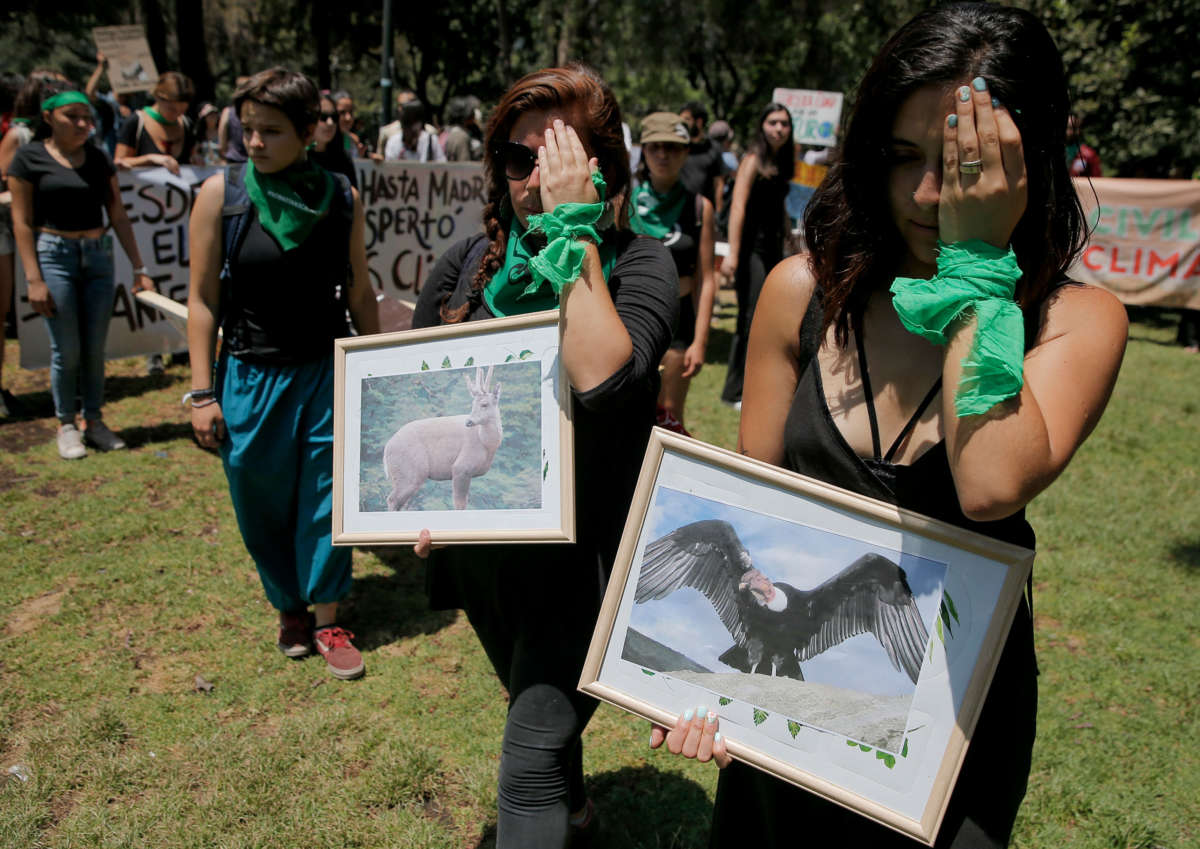Overshadowed by events in Madrid, where the United Nations COP25 conference is taking place, activists in the Chilean capital, Santiago, are eager that social justice becomes more central to international climate discussions. On December 2, the first day of COP25, more than 100 environmental groups launched a parallel conference in Santiago. And on Friday, several thousand people participated in a series of marches organized by these groups and their allies.
The week-long Peoples’ Summit drew climate campaigners from several countries in Latin America as well as North America.
“We are trying to create awareness of the climate crisis that we are experiencing in this country”, Felipe Hernandez of Fridays for Future, Santiago, said at a march where protestors carried a symbolic coffin for the condor to represent the bird’s decline due to a changing environment. “We have tried to speak with the government, but the conversation has been lukewarm. There have only been empty discourses. They don’t listen to us. The only thing that the government does is repress us.”
Most of the marches convened at the city’s central Plaza Italia, a focal point for ongoing anti-government demonstrations that began in October when the Chilean administration proposed raising subway fares in the capital’s network by 30 pesos (approximately $0.04). The decision, which was soon reversed, led to public outcry that the government has been out of touch with social needs of all but the wealthiest of its citizens, underlining deep economic divisions within Chilean society.
President Sebastian Piñera announced at the end of October that the country will not host the UN summit, saying the government needed to focus on the social and political crisis. Chile, which also postponed its plan to announce a new, more robust climate target at the climate conference, officially retains the presidency of the conference.
Since the beginning of protests, over 3,449 people have been injured in violence with state security forces. Also, 23 persons died as a result of force used in the unrest, according to the National Institute for Human Rights.
A central theme of these protests has been criticism of the private sector’s role in administering basic public services and the political clout of major businesses, which environmental campaigners say is the reason for insufficient climate action by the nation. Access to water, and its privatization is a common concern.
“We call for the right to water for nature and for people. We ask that water be recognized as a common good and not an end for consumption used for the extractive sector,” said Camila Zarate, spokesperson for the Peoples’ Summit in Santiago. “There is no social justice without environmental justice.”
Even before mass protests began nearly two months ago, Chileans have been demanding that laws that privatized Chile’s water supply be repealed. Water began to be privatized in Chile in 1981 under the dictatorship of General Pinochet. The availability of water in the Santiago metropolitan region, meanwhile, is expected to fall by 40 percent by 2070. This year has been the driest in the capital since 1950. (In September, President Piñera set up a working group of government agencies, academics, and industry representatives to tackle the worst drought in 60 years.)
At Friday’s marches, several environmental activists said they thought that negotiators in Madrid are still very removed from realities that people face in places where the climate crisis is already occurring.
Nicole Vergara, a member of Mingako, a Santiago-based environmental NGO that promotes sustainable living, said, “Discussions take place in a vacuum, and are totally disconnected to people like us who experience the effects of what they do not achieve. Naturally, we lack confidence in the international talks because they had the opportunity for years to halt this catastrophe… and to stop fossil fuel emissions, extractive industries and to stop the damage being done to Indigenous peoples.”
Among activists attending the protests, there was a sense that economic and political conditions in Chile are present in other countries as well.
Teresa Almaguer, a member of a California grassroots group called Poder, said that many communities in her home state face similar concerns.
“A lot of these same conditions [exist], especially in working-class communities of color. Most planning departments in the cities of the United States have placed the brunt of pollution in these communities.” She said businesses have been able to operate with impunity in these areas, adding that migrants who may have fled areas that have faced environmental destruction are now being held in custody at the US border.
Reflecting a common concern amongst activists in Chile and elsewhere towards the climate crisis, marchers held signs that said: “From Santiago to Madrid, the world has woken up to the climate crisis.”
While the marches were underway on Friday, the Chilean government announced a 2.7 percent increase in wages for state employees earning the lowest incomes, prompting concerns amongst some that short-term solutions to the unrest may shift attention away from the climate crisis.
But others were confident that next year’s planned referenda on a new constitution and a body responsible for drafting the document should allow for the necessary measures to be introduced.
“Structural changes need to take place in order that they listen to us,” Vergara of Mingako said.
Join us in defending the truth before it’s too late
The future of independent journalism is uncertain, and the consequences of losing it are too grave to ignore. To ensure Truthout remains safe, strong, and free, we need to raise $33,000 in the next 2 days. Every dollar raised goes directly toward the costs of producing news you can trust.
Please give what you can — because by supporting us with a tax-deductible donation, you’re not just preserving a source of news, you’re helping to safeguard what’s left of our democracy.
